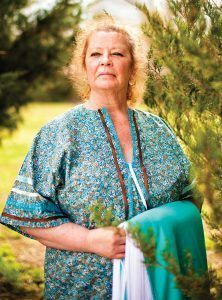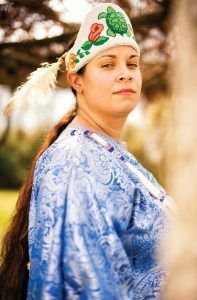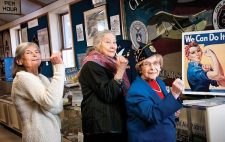The words Lenni-Lenape translate to “men of men,” but at the tribal lands of the Nanticoke Lenni-Lenape in Bridgeton, a group of women have shouldered the responsibility of preserving beliefs, traditions and a culture that was nearly lost.
The tribe’s history on the East Coast goes back thousands of years, and the Lenape were one of the first tribes to interact with European settlers. In 1778, the United States government signed their first treaty, an agreement that said the Lenape would be granted statehood if the tribe helped the revolutionaries fight against the British. After the war, the tribe did not receive statehood and instead spent the next 150 years embroiled in battles and controversy, often being killed or forced from their homes.
Today, students in our public schools sometimes learn about the history of South Jersey’s earliest inhabitants. What they don’t learn, says Gail Gould, a Salem County resident and member of the Nanticoke Lenape, is that the tribe is still very much alive and well in South Jersey.
 “If they learn about our people at all, they learn in past tense,” says Gould, 56. “They learn in class that all of our people left New Jersey, and many of us did – our ancestors were forced onto the Trail of Tears. Many folks ended up in Oklahoma on the Cherokee reservation or in the Midwest, in Indiana or Wisconsin. What people don’t realize is not everyone left. There were those of us who chose to stay behind, and for a long time those families did their best to assimilate.”
“If they learn about our people at all, they learn in past tense,” says Gould, 56. “They learn in class that all of our people left New Jersey, and many of us did – our ancestors were forced onto the Trail of Tears. Many folks ended up in Oklahoma on the Cherokee reservation or in the Midwest, in Indiana or Wisconsin. What people don’t realize is not everyone left. There were those of us who chose to stay behind, and for a long time those families did their best to assimilate.”
Members of the tribe who are in their 60s and 70s witnessed their parents and grandparents hiding in plain sight – “passing” as Caucasian, Hispanic or African-American.
Though her family practiced their traditional cultural customs behind closed doors, Darlene Mosley, 69, recalls a current of fear that ran through her family.
“Our parents’ generation and the generation prior were so private, because they were afraid,” she says. “They thought if people knew we were Native American the government would come and take their homes, take their land. Native Americans weren’t even considered citizens until 1924, so everyone pretended to be something else. They’d call you whatever they thought you were based on your complexion, and you just went with that. My sister is very fair and blonde, so she was considered white, and I had dark hair and a more olive complexion, so I was always ‘other.’”
Most members of the tribe have vivid memories of the prejudice and discrimination they faced when they were open about their heritage. They were mocked and bullied, beaten up and subjected to racial slurs.
“When I was in fifth grade we had a heritage project, and I had no idea what to do it on because it was always so hush-hush,” remembers Nellie Pierce-Durham, 66. “When I got to class and talked about my family, my teacher laughed me right out of the classroom. She told me I was a ‘half-breed.’”
Though the world is arguably more tolerant today than when she was in school, Edie Pierce, 69, says her children and grandchildren still encounter prejudice, mostly as a result of misinformation and lack of education.
“When I was in school, my teacher asked everyone to stand up and say what they were. I said ‘American Indian,’ and he said, ‘I don’t think so. We’ll talk after class,’” Pierce says.
“When my daughter was about the same age, her teacher said, ‘All your relatives come from Europe,’ and my daughter said, ‘I’m a Native American. My people have been here for thousands of years.’ The teacher said, ‘No, you can’t be.’ This is the problem. For centuries, and still today, there have been people trying to tell us who we are. We know who we are.”
In the mid-1970s, members of the 30 or so families who make up the Nanticoke Lenape tribe set out to publicly reorganize, forming a nine-member tribal council and holding larger gatherings. In 1978, Congress passed the American Indian Religious Freedom Act, giving the tribe the right to practice their religious beliefs and hold prayer ceremonies. The Nanticoke formed a nonprofit community benefit agency, “The Nanticoke Lenni-Lenape Indians of New Jersey,” to promote the tribe’s welfare and establish cultural and educational facilities.
Pierce-Durham says the abuse she suffered at the hands of her peers and her parents’ insistence on secrecy pushed her to help reestablish the tribe’s identity for the benefit of her own children.
“We knew what we were – we just weren’t allowed to talk about it,” she says. “But my mother and father taught us to be tough and to fight for what we believe in. When I had my own children, I realized I needed to do something to help them. I told them from the time they were young, ‘If you don’t fit anywhere, you have to make your own path. If they don’t make a place for you, you make a place for yourself. You have to fight twice as hard to get what you want out of life, because no one is going to give it to you.’ I raised my children to be proud of who they are.”
Edie Pierce says one of the pieces of advice she gave her children was to marry within the tribe; advice she was given herself, but for a very different reason.
“It was common for our parents to tell us, ‘Stick with your own,’ she says. They told us that to protect us. We ideally wanted our kids to marry within the tribe, not necessarily to protect them, but just to keep our culture and bloodlines alive.”
Finding a suitable partner, however, is easier said than done. The women and men of the Nanticoke Lenape all refer to one another as “aunt” and “uncle,” both out of respect and because, somewhere along the line, most of them are related by blood.
“We took our kids to powwows all over the place,” Pierce says. “We went all the way to North and South Carolina to meet other people so there would be a distance between the tribal families. I always told my daughters to go out and find a Native American fella, but not one who’s your cousin!”
Lia Gould-Ellis, 28, had what she admits was an unorthodox childhood. She’s the daughter of Gail and Mark Gould, and her father is the tribe’s chief. From a young age, she was taught to be vocal about her heritage in an effort to educate her peers.
“Growing up I always had people telling me, ‘You’re not native, there are no natives in New  Jersey,’” Ellis says. “My parents held an educational program at my school every single year, and they always encouraged me to talk about what being Native American meant.”
Jersey,’” Ellis says. “My parents held an educational program at my school every single year, and they always encouraged me to talk about what being Native American meant.”
Ellis says growing up in a traditionally matriarchal tribal society helped her become a strong, self-sufficient woman.
“We joke about it, but it’s really true: the women run the tribe,” she says. “Traditionally, the chief always discussed decisions with the elder women. We believe women carry a lot of power. One of our ceremonies revolves around the menstrual cycle, which we call a woman’s ‘moon.’ We believe women are at their strongest then, and when a woman gets her first moon we have a coming out ceremony.”
“It’s a cultural thing that was very important to me when I was young,” Ellis continues, “and when my daughters have their first moon, they’ll complete the ceremony too.”
Each summer, Ellis’ children attend summer camp at the Nanticoke Lenape tribal lands – 28 acres in Cumberland County purchased by the tribe in 1995. On average, Gail Gould says the campers, including her own grandchildren, number more than 50.
“It’s a totally free all-day summer camp for Nanticoke Lenape kids,” Gould says. “They come in the morning and have breakfast, and our spiritual leader takes them down to the prayer circle and teaches them about our spiritual traditions. Then they come back and have classes and do traditional crafts and other activities.”
One of the most important things the kids learn, Gould says, is the native Lenape language, which was nearly lost due to disuse among older generations.
“You might hear us older people use words now and then, but we can’t really speak it,” she says. “But we have a young man who comes in and teaches the kids, and their minds are like sponges. It’s amazing how quickly they learn. My grandkids are at the point where they’re speaking in phrases.”
The tribe’s children are not only bringing back the native language – in some ways they’re reinventing it, Gould says.
“The original language is so old there aren’t words for things like refrigerator or television,” she says. “So they take two separate words, like ‘cold’ and ‘box,’ and make a new Lenape word. It’s such a cool experience, to be both learning a language that’s existed for centuries and bringing it up to the 21st century.”
Ellis encourages her children to speak Lenape as often as possible and to educate their friends about their culture. She does her part to educate the greater public by hosting an annual powwow the second weekend in June, which draws nearly 2,000 spectators.
“Every year we have between 100 and 150 dancers and drummers competing in various categories,” Ellis says. “The dancers range from toddlers to people in their 80s. We have Native American food and craft vendors, music, and storytelling. We do something called the Friendship Dance, where we invite the non-native community to come and dance with us.”
Ellis says the powwow is an opportunity for the community to experience the Nanticoke Lenape culture, learn about South Jersey’s past and celebrate its diverse present.
“It’s not only a time for us to get together as a community of native people, but also a time to share with the rest of South Jersey,” Ellis says.
“We’re considered ‘The Forgotten People.’ We stayed here and stayed hidden for a long time, so to this day, not many know we’re here,” she adds. “This is our way of educating the people that we are still here. We work with you. We go to school with you. We’re your neighbors, and we are still here.”











